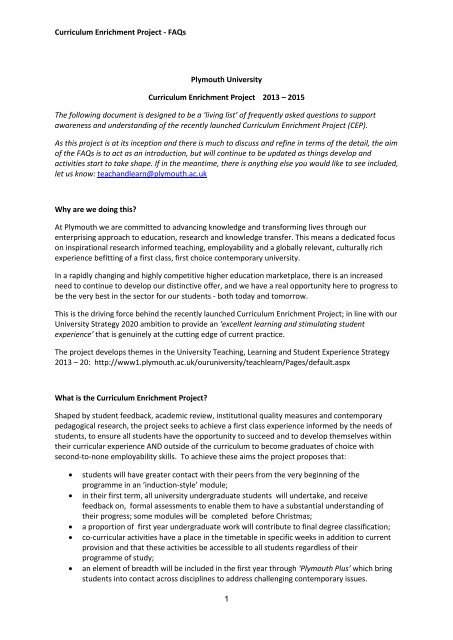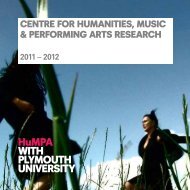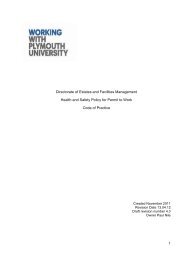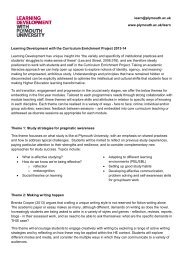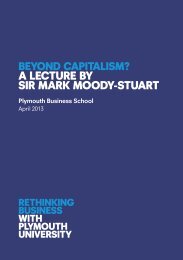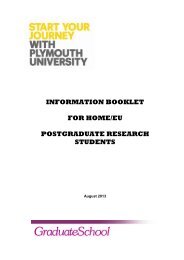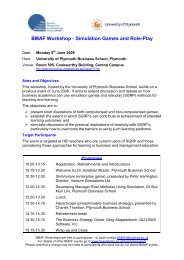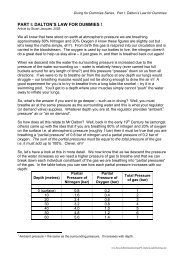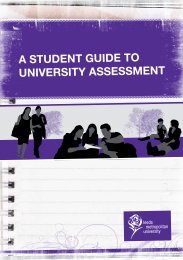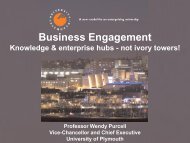Curriculum Enrichment Project - FAQs 1 Plymouth University ...
Curriculum Enrichment Project - FAQs 1 Plymouth University ...
Curriculum Enrichment Project - FAQs 1 Plymouth University ...
Create successful ePaper yourself
Turn your PDF publications into a flip-book with our unique Google optimized e-Paper software.
<strong>Curriculum</strong> <strong>Enrichment</strong> <strong>Project</strong> - <strong>FAQs</strong><br />
<strong>Plymouth</strong> <strong>University</strong><br />
<strong>Curriculum</strong> <strong>Enrichment</strong> <strong>Project</strong> 2013 – 2015<br />
The following document is designed to be a ‘living list’ of frequently asked questions to support<br />
awareness and understanding of the recently launched <strong>Curriculum</strong> <strong>Enrichment</strong> <strong>Project</strong> (CEP).<br />
As this project is at its inception and there is much to discuss and refine in terms of the detail, the aim<br />
of the <strong>FAQs</strong> is to act as an introduction, but will continue to be updated as things develop and<br />
activities start to take shape. If in the meantime, there is anything else you would like to see included,<br />
let us know: teachandlearn@plymouth.ac.uk<br />
Why are we doing this?<br />
At <strong>Plymouth</strong> we are committed to advancing knowledge and transforming lives through our<br />
enterprising approach to education, research and knowledge transfer. This means a dedicated focus<br />
on inspirational research informed teaching, employability and a globally relevant, culturally rich<br />
experience befitting of a first class, first choice contemporary university.<br />
In a rapidly changing and highly competitive higher education marketplace, there is an increased<br />
need to continue to develop our distinctive offer, and we have a real opportunity here to progress to<br />
be the very best in the sector for our students - both today and tomorrow.<br />
This is the driving force behind the recently launched <strong>Curriculum</strong> <strong>Enrichment</strong> <strong>Project</strong>; in line with our<br />
<strong>University</strong> Strategy 2020 ambition to provide an ‘excellent learning and stimulating student<br />
experience’ that is genuinely at the cutting edge of current practice.<br />
The project develops themes in the <strong>University</strong> Teaching, Learning and Student Experience Strategy<br />
2013 – 20: http://www1.plymouth.ac.uk/ouruniversity/teachlearn/Pages/default.aspx<br />
What is the <strong>Curriculum</strong> <strong>Enrichment</strong> <strong>Project</strong>?<br />
Shaped by student feedback, academic review, institutional quality measures and contemporary<br />
pedagogical research, the project seeks to achieve a first class experience informed by the needs of<br />
students, to ensure all students have the opportunity to succeed and to develop themselves within<br />
their curricular experience AND outside of the curriculum to become graduates of choice with<br />
second-to-none employability skills. To achieve these aims the project proposes that:<br />
<br />
<br />
<br />
<br />
<br />
students will have greater contact with their peers from the very beginning of the<br />
programme in an ‘induction-style’ module;<br />
in their first term, all university undergraduate students will undertake, and receive<br />
feedback on, formal assessments to enable them to have a substantial understanding of<br />
their progress; some modules will be completed before Christmas;<br />
a proportion of first year undergraduate work will contribute to final degree classification;<br />
co-curricular activities have a place in the timetable in specific weeks in addition to current<br />
provision and that these activities be accessible to all students regardless of their<br />
programme of study;<br />
an element of breadth will be included in the first year through ‘<strong>Plymouth</strong> Plus’ which bring<br />
students into contact across disciplines to address challenging contemporary issues.<br />
1
<strong>Curriculum</strong> <strong>Enrichment</strong> <strong>Project</strong> - <strong>FAQs</strong><br />
Who does this affect?<br />
The <strong>Curriculum</strong> <strong>Enrichment</strong> <strong>Project</strong> is designed to underpin an innovative foundation for the<br />
curricula across all <strong>University</strong>, PAHC and Truro, so that all students have comparable opportunities<br />
to succeed whatever their course, discipline or location of study.<br />
When will it be implemented?<br />
While there is a need to begin to realise real change, starting is 2014, we also need to be mindful of<br />
the quality framework in which the <strong>University</strong> operates and to minimise any potential impact on the<br />
staff or student experience. For example, timescales need to take into account for professional and<br />
regulatory body accreditation schedules and requirements; we are currently working through this as<br />
well as other practical aspects that have so far been shared.<br />
How will it be implemented?<br />
We recognise that there is already good practice in curriculum innovation across the <strong>University</strong>, but<br />
this is not universal. Therefore there needs to be engagement with a wide range of staff across<br />
disciplines, to share and develop this activity and harness best practice so that a ‘<strong>Plymouth</strong>’ model<br />
can evolve.<br />
The project is at a very early stage, having only been launched in late May 2013; therefore much of<br />
the detail is subject to discussion and refinement. A discussion phase is currently underway in order<br />
to give everyone the opportunity to review the proposals and consider their underlying principles, to<br />
work through potential impacts in their particular areas and to identify opportunities and propose<br />
alternative approaches.<br />
Critical to the project is input from staff and students - so that we can shape an informed, reflective,<br />
risk-aware and evidence-based approach that achieves our ambitions whilst protecting and<br />
enhancing best practice, ensuring professional and regulatory accreditation and promoting<br />
opportunities to deliver new ways of working with our students. Central to our ‘Students and<br />
Partners’ ethos, this is a partnership project, and with our students, we will use their insights to help<br />
develop our thinking.<br />
Who is leading on the project?<br />
The <strong>Project</strong> steering group is led by Professor David Coslett, Professor Pauline Kneale, Professor<br />
Richard Stephenson, Steph Discoll the Sabbatical Education Officer from UPSU, the ADTLs, Professor<br />
Neil Witt and Pat Wilde, Head of Quality Operations This will be supported by a number of ‘task and<br />
finish’ sub groups considering each area of the project. As the project evolves each School will have a<br />
dedicated representative whose role it will be to work with the ADTLs, FBMs and the Central Quality<br />
Office.<br />
How should staff present/market their programmes given that they might be subject to change?<br />
Discussions are very much on-going and final decisions about the project have yet to made, however<br />
as a result of the project, subject content and outcomes are likely to remain very much the same.<br />
2
<strong>Curriculum</strong> <strong>Enrichment</strong> <strong>Project</strong> - <strong>FAQs</strong><br />
Therefore staff should be encouraged to talk confidently and enthusiastically, as they always have<br />
done, about their academic offer at events such as Open Days.<br />
How can I get involved?<br />
Please take a moment to give us your feedback via teachandlearn@plymouth.ac.uk, so that your<br />
very valuable views and ideas and any questions you might have can be shared with those leading<br />
the project. The project is still at a very early stage, so we don’t have all the answers at the moment<br />
- many will need further thought and discussion. If you want to play a more active role, for example<br />
on one of the subject groups, please contact Professor Pauline Kneale.<br />
How do I get support for teaching and learning innovation?<br />
Active learning workshops in support of this process are being run by ED ASTI and external experts.<br />
Please register for workshops via the link at<br />
http://www1.plymouth.ac.uk/ouruniversity/teachlearn/Pages/<strong>Plymouth</strong>-<strong>University</strong>-<strong>Curriculum</strong>-<br />
<strong>Enrichment</strong>-<strong>Project</strong>-2013---2015.aspx<br />
What happens next?<br />
Key activity in the first few weeks has very much been about consultation and dialogue to inform the<br />
way forward and start to look at the detail. Mostly, the principles underpinning the CEP have been<br />
received positively, but we know there are concerns about the detail. The next step is to address<br />
these though open forum meetings with school and programme groups, school business meetings,<br />
teaching and learning away days etc.<br />
Where is the project documentation?<br />
The original document and updates are available at<br />
http://www1.plymouth.ac.uk/ouruniversity/teachlearn/Pages/<strong>Plymouth</strong>-<strong>University</strong>-<strong>Curriculum</strong>-<br />
<strong>Enrichment</strong>-<strong>Project</strong>-2013---2015.aspx<br />
Last updated – 6 July 2013<br />
3


